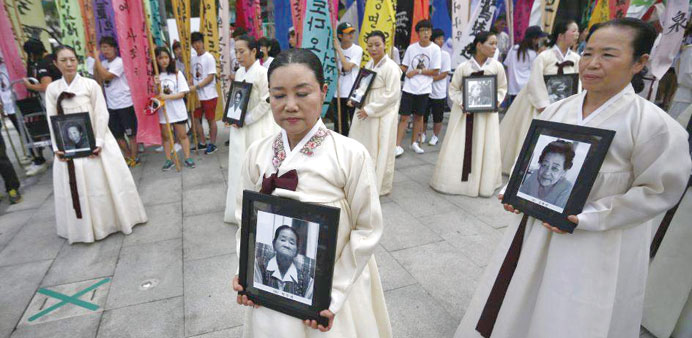Agencies/Geneva
A UN human rights agency has called on Japan to guarantee independent investigations of wartime sex slavery and provide a public apology and compensation to the women who were victims.
Some historians estimate that as many as 200,000 so-called comfort women, many from South Korea and China, were forced into the Imperial Japanese Army’s brothels before and during World War Two.
The UN Human Rights Committee, which was reviewing the human-rights records of several countries, said last week that all claims for reparation brought by victims before Japanese courts have been dismissed. It also said all complaints seeking criminal investigations and prosecutions have been rejected on grounds of the statute of limitations.
“The Committee considers that this situation reflects ongoing violations of the victims’ human rights, as well as a lack of effective remedies available to them as victims of past human rights violations,” the panel said, citing articles of the UN civil and political rights treaty ratified by Japan.
Last month, South Korea protested against a review by Tokyo of a 1993 apology to the women, which found that Japan and South Korea had worked together on the wording of the apology. Nevertheless, officials from Prime Minister Shinzo Abe on down have said Japan will not revise the statement.
Japan also said compensation for women forced to work in the brothels was settled by a 1965 treaty establishing diplomatic ties with South Korea. In 1995, Japan set up a fund to make payments to the women from private contributions, but South Korea has said that was not official and so not enough.
The UN committee last Thursday urged Japan to “ensure that all allegations of sexual slavery or other human rights violations perpetrated by Japanese military during wartime against the ‘comfort women’, are effectively, independently and impartially investigated and that perpetrators are prosecuted and, if found guilty, punished”.
The panel noted that Japan’s position was “contradictory:” it says the comfort women were generally recruited and transported through coercion, but they were not “forcibly deported”.
But such acts carried out against the will of the victims meant Japan had a “direct legal responsibility,” said the committee, which is composed of 18 independent experts.
“The Committee is also concerned about re-victimisation of the former comfort women by attacks on their reputations, including some by public officials and some that are encouraged by the state party’s equivocal position,” the panel said.
The mayor of the Japanese city of Osaka said in May 2013 that Japan’s system of military brothels was “necessary”, drawing outrage in South Korea and China.
The experts called for “a public apology and official recognition of the responsibility” of Japan. Any attempts to defame victims or deny the events should be condemned, it added.
Japan was also requested to fully educate students and the general public about the issue, including adequate references in textbooks.
The UN committee was chaired by British expert Sir Nigel Rodley.
But Japan rejected the call by the UN committee that it should accept full blame for pressing Asian women into wartime sexual slavery in military.
The Japanese foreign ministry said the UN committee was expected to adhere to the International Covenant on Civil and Political Rights, which Tokyo ratified in 1979. The covenant, it said, could not be applied to issues pre-dating 1979.
Tokyo had issued a landmark apology in 1993 called the Kono statement that officially acknowledged the Japanese military used coercion in operating the brothel system but did not admit the government’s complicity. But the political right continue to cast doubt on the Kono statement, claiming the brothels were staffed by professional prostitutes.
Japan recently conducted a review of the issue and asserted there was no evidence to corroborate interviewed comfort women’s testimony on sexual slavery, sparking regional anger.
Japan had offered to compensate former comfort women through a private fund set up in 1995 that lasted until 2007. But many of the survivors shunned the cash as it did not come directly from the government. South Korea had also rejected the fund as it was not official.
South Korea and China have accused Japan of refusing to face up to its history.

A march in Korea displays portraits of women who were made sex slaves by the Japanese military during World War II.
